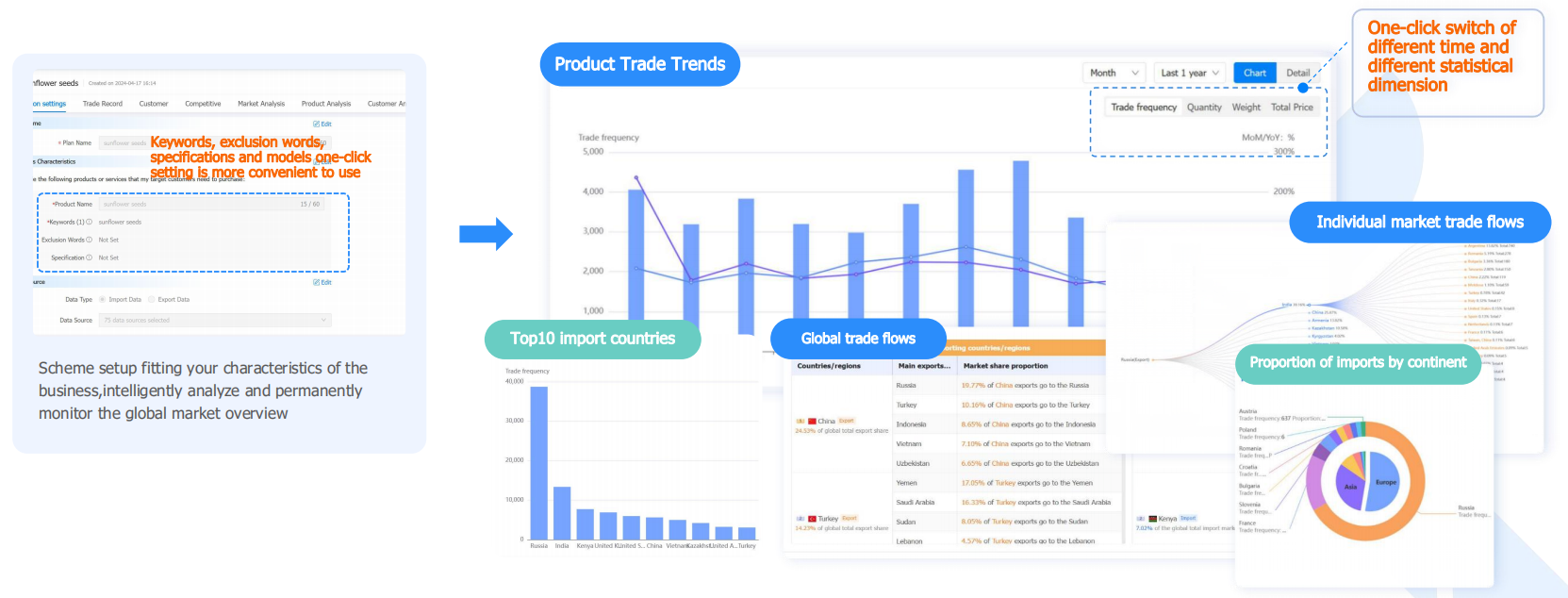 Trade Data
Trade Data
 21-08-2024
21-08-2024
Export to China presents significant opportunities for businesses looking to tap into one of the world's largest and fastest-growing markets. However, navigating the complexities of export to China requires careful planning, understanding of regulations, and strategic market entry. In this guide, we'll explore the essential steps to successfully export to China, including the importance of leveraging tools like Tendata's customs data to enhance your export strategy.

1. Understand the Chinese Market
Before diving into the export process, it's crucial to understand the Chinese market. China's consumer base is diverse, with varying preferences across different regions. Conduct market research to identify your target audience, understand their needs, and tailor your products accordingly. Consider factors such as local tastes, purchasing power, and cultural preferences.
2. Comply with Regulatory Requirements
China has specific regulatory requirements for imported goods. These include product standards, labeling, certification, and customs procedures. Ensure that your products meet the necessary standards, such as the China Compulsory Certification (CCC) mark, and comply with all labeling and packaging regulations. Failure to comply with these requirements can result in delays, fines, or rejection of your goods at the border.
3. Choose the Right Export Strategy
There are several ways to enter the Chinese market, each with its advantages and challenges:
Direct Exporting: This involves selling directly to Chinese customers or distributors. It's a straightforward approach but requires a deep understanding of the market and regulatory environment.
Indirect Exporting: In this strategy, you work with intermediaries such as agents, distributors, or trading companies. This can reduce your risk and ease market entry, but you'll need to share a portion of your profits with these partners.
E-commerce Platforms: China has a thriving e-commerce market, with platforms like Tmall and JD.com offering access to millions of consumers. Selling online can be a cost-effective way to reach Chinese customers, especially for small and medium-sized enterprises.
4. Leverage Tendata's Customs Data
To succeed in the Chinese market, you need to stay ahead of the competition and make informed decisions. This is where Tendata's customs data comes into play. Tendata provides comprehensive customs data that allows you to analyze market trends, track competitor activities, and identify potential buyers in China. By using Tendata, you can gain insights into import volumes, pricing strategies, and the performance of your products in the Chinese market. This data-driven approach helps you tailor your marketing and sales strategies, ensuring that your products meet the demands of Chinese consumers.
Click here to try a free online demo about Tendata
5. Establish Strong Relationships
Building strong relationships with Chinese partners, distributors, and customers is key to long-term success. Chinese business culture places a high value on trust and relationships, often referred to as "guanxi." Invest time in developing these connections, attending trade shows, and participating in industry events to establish your presence in the market.
6. Adapt to the Local Business Environment
China's business environment is unique, and success often depends on your ability to adapt. Be prepared to negotiate extensively, as bargaining is a common practice in China. Additionally, understanding the local regulatory environment, payment practices, and logistics is essential for smooth operations.
7. Monitor and Adjust Your Strategy
The Chinese market is dynamic, with consumer preferences and regulations constantly evolving. Regularly monitor your performance, gather feedback from your customers, and be ready to adjust your strategy as needed. Tendata's customs data can be a valuable tool in this process, providing you with real-time insights into market changes and helping you stay ahead of the competition.
Conclusion
Export to China offers immense potential for growth, but it requires careful planning and a well-executed strategy. By understanding the market, complying with regulations, choosing the right entry strategy, and leveraging tools like Tendata's customs data, you can position your business for success in this lucrative market. Whether you're a seasoned exporter or new to the Chinese market, the right approach can help you unlock the full potential of your business in China.
Click here to try a free online demo about Tendata
From traditional data retrieval to constructing business scenarios, Tendata T-Insight employs multiple analysts to work for you.
With intelligent market analysis, it assists in saving analysts' time and your money.
Eliminate the need for manual and frequent searches and analyses. With Tendata, you can effortlessly grasp product trade trends, trade flows, top 10 import and export countries with a single click, understand market trends, and identify high-value regions.

Category
Leave Message for Demo Request or Questions


 T-info
T-info T-discovery
T-discovery

 My
Tendata
My
Tendata Market Analysis
Market Analysis Customer
Development
Customer
Development Competitor
Monitoring
Competitor
Monitoring Customer Relationship
Customer Relationship




































































































































